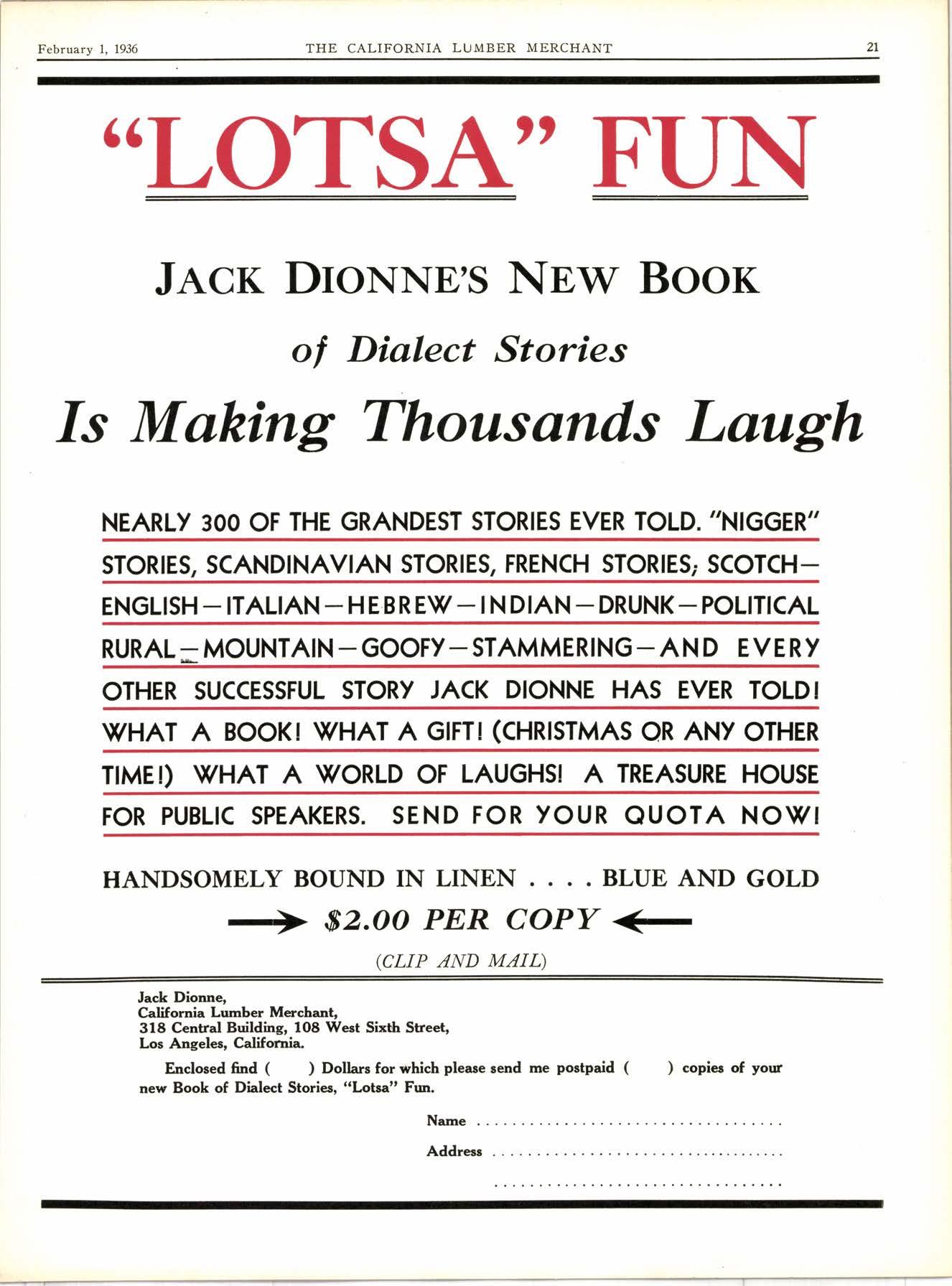
3 minute read
Vagabond Editorials
Bv Jack Dionne
And another thing about those nine old gentlemen with the long black robes, in Washington. You can't bluff 'em. If they could be bluffed we'd still have NRA, AAA, and Hell to Pay.
,f)8*
I was running back through my writings you suppose he would have been? What would he have accomplished? ri*>I and in January lst, 1916, twenty years self quoting Woodrow Wilson, then United States. He was giving people running to Washington for help, aid, said: "You do not need W enough in this country to master world. When I hear Americans by authority, I WONDER BORN. I wonder how long years ago found myof the Hades for assistance. He There is genius enterprise of the to be assisted ERE, THEY WERE have breathed the air of America. I wonder naturalization are." their papers of spiritual
I agreed with that opinion then. I still do. I{owever, at that time it was a popular sentiment. It had been since 1776. Right now those kind of sentiments would be as popular at Washington as a skunk at a lawn party.
Last week two Englis;; :aa who made the front pages. They were King George, and Rudyard Kipling. The world joins Britain in mourning her late King. The files of the newspapers are given over to his life, and to his successors. Kipling waxes small by comparison. Never in history did two men die so close together whose lives give us more to think about.
As kings go, George -:. : "l"tt -or"rch. There was no meanness in him. He was steady, dependable, likable, tolerant, courageous. That's a whole lot to be said of any man. He was colorless, of course. He said nothing, did nothing, as far as we know he thought nothing, that will make any mark on history. In all his life he made fewer dramatic and vital decisions with regard to Britain than the President of the United States has to make every morning before breakfast. But he was a good guy, and the world is right in praising him.
He was, of course, o"; ," ol, ,"0. "The divine right of kings" made him monarch of all Britain. Had he been born in the same strata of society as was Kipling, what do
And think of that other man, Kipling. No divine right rnade him king. But he was more than any king has ever been; he was genius unquestionable; a flaming mentality that wrotes its mark so high and so definite on the scroll of time, that it will never be erased. God touched him with that brush of genius. King George died and became irnmortal. Kipling became immortal long before his death. God not only gave him immortality, but bequeathed to hi.m the right to delegate immortality. Will the characlers he built, the songs he sang, the stirring philosophies he penned, the mighty patriotism he painted ever die, tfiinlr You? *
As long as Britain lives-yes and perhaps long afterward-as long as the English tongue is spoken, the words, the characters, the songs, the philosophies of Kipling will remain deeply imprinted in the minds and upon the literature of mankind. A thousand years hence, when the passing of Kipling's own soul has been long forgotten, men will sit with lumps in their throats as they listen to that mighty song of the passing of the soul of Danny Deever, who was hangin' in the mornin', *:t*
Will Mulvaney ever die? He who was had been a corporal, but was rejuced? Will the Colonel's lady and Judy O'Grady, and their proclaimed under-skin sisterhood, ever cease to be? Will the time ever come, think you, when the devotion of that Lazarooshian leather Gunga Din will cease to be solace to the souls of men? .WiU Britain ever cease to spring to attention at "Oh, God of Hosts be with us yet, lest we forget, lest we forget" ? Will the Eton school boy's rallying cry, "Play up, play up, and play the game," ever be forgotten? Will the Road to Mandalay ever be less a thoroughfare of romance and of sentiment than it is today?
,F r& {< ft seems almost a crime to single out a few from the wealth of immortality he has left us as a heritage. Personally I enjoy his writings more than those of any other poet that ever drew the breath of life. f do not ascribe to him the measureless genius of that mighty ocean of thought whom men call Shakespeare; but I enjoy him
(Continued on Page 8)









